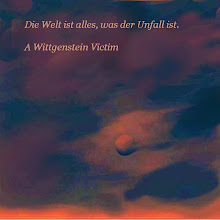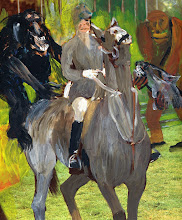1. The panoptic corridor of The Music School leading to the room of the violin teacher is lit up now more often than before. The room though is mostly dark. It used to be the other way around. The corridor is the empty stage. But whenever a figure might appear on stage at any time, then that emptiness is all readiness, not really empty any more. Even if the figure never appears, if something, someone detains him forever. It is still his stage and only his. His light. The burglar light.
Another late night presence - in the humble architect's office over the defunct "Coffee Shop" of the unlucky Portuguese couple a light was on in the stairway behind the frosted glass door and upstairs in his 'atelier'. The office is right on the river Long which runs like a canal under the High Street, so dark and hidden you almost overlook it. You are only reminded by the noise from an occasional water creature on the river bank - the flapping wings of some of the Queen's Swans or one of those itinerant fish-boys. The Portuguese "Coffee Shop" lasted longer than most fish-boys, but it too was eventually condemned to death by the Lords of 'Überburbia'. The architect's light was far more solitary than the light at the upstairs window of the veterinarian's. For the architect is deep in the pursuit of some aesthetic truth, if only in the form and content of a kitchen extension or a driveway. The vet's light belongs to the false hope of all such emergency services or to the periodic bachelors who rent the upper room. Odd that I associate the architect's light with work, the vet's with emergency, the violin teacher's with show. It's not odd.
When Cicero was not in Rome some said it was as if Rome itself were solitary. I wonder if they say the same about London when the Queen's away.
2. Why is it considered mandatory or hygienic to read only one book at a time and front to back, cover to cover? Even if you don't, you feel guilty about it. Don't you ever speak to more than one person at a time or in a day? Such exclusiveness does not exist otherwise in life. Are books still considered more sacred or more deserving of such undivided attention than anything else? Some books can only be endured by reading them together with an antidote. Schubert's "Die Geschichte der Seele" (The History of the Soul) in which he develops his theories of "Scheintod" (suspended animation) should only be read, if at all, interspersed with fragments of Schopenhauer. The only two persons I've met who 'confessed' to not being able not to finish a book no matter how bad (and whom I believed) were a chemist in Jerusalem and a tax inspector in Biedenkopf.
3. Pessoa is most uncanny. How long I've 'known' him already - almost 9 years - and have barely scratched the surface. To think that he hardly ever left his native Lisbon. The life of a bookkeeper is the same all over the world - everywhere it's just a 'voyage around the room'. I had just been thinking about the far too many books open on my desk. At the bottom of a diminutive stack of three was Hume's "A Treatise of Human Nature". I tried to recall what it was that I'd discovered was entirely missing from his view of human nature. I think - it was the unconscious. Pessoa then, as if speaking in turn: "The only advantage of studying is to take delight in what others haven't said."
("The Book of Disquietude")
("The Book of Disquietude")
4. I am most like myself, when I use a line from my writing in everyday life. Such as telling the two post office cashiers "I have no favorites". I am least like myself when I use a line from everyday life in my writing - mostly to repay a secret debt. Everyday life includes other people's literature - the life which is Swinburne, or Hofmannsthal's love of Swinburne and all those lives containing this fact. All of them excluding mine. Feelings though have no concern for the facts. Feelings invent the facts to correspond to feelings.

















.jpg)














No comments:
Post a Comment